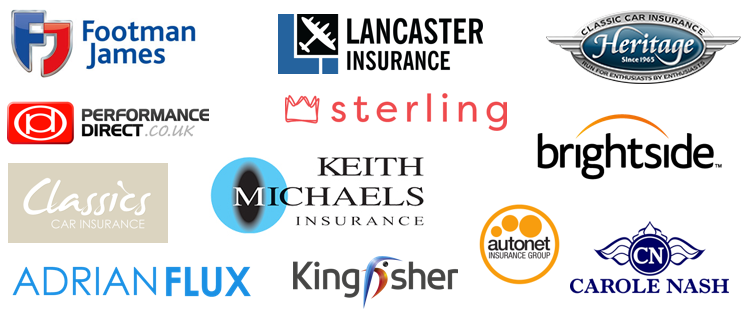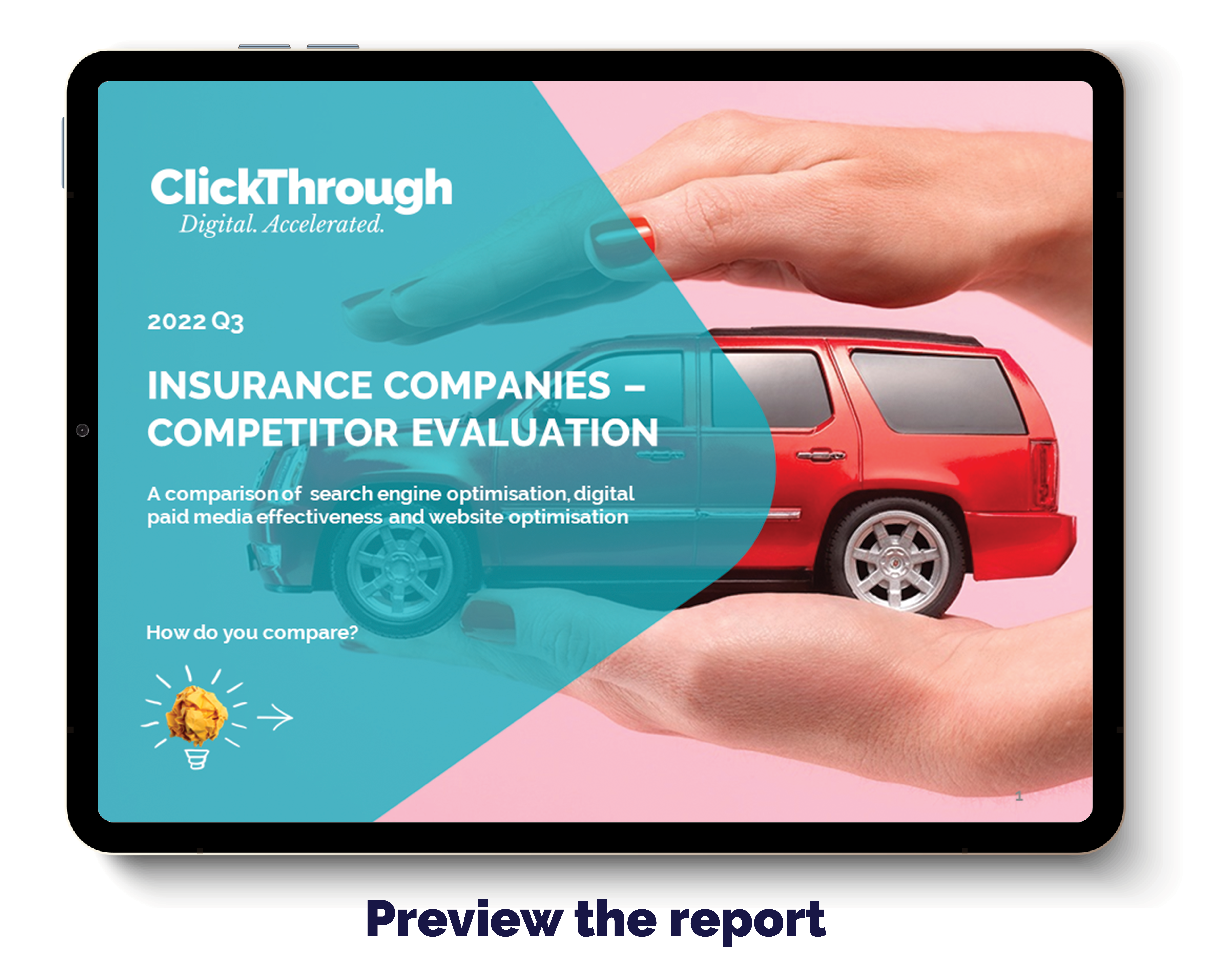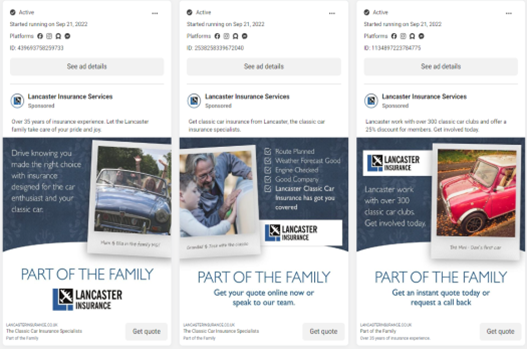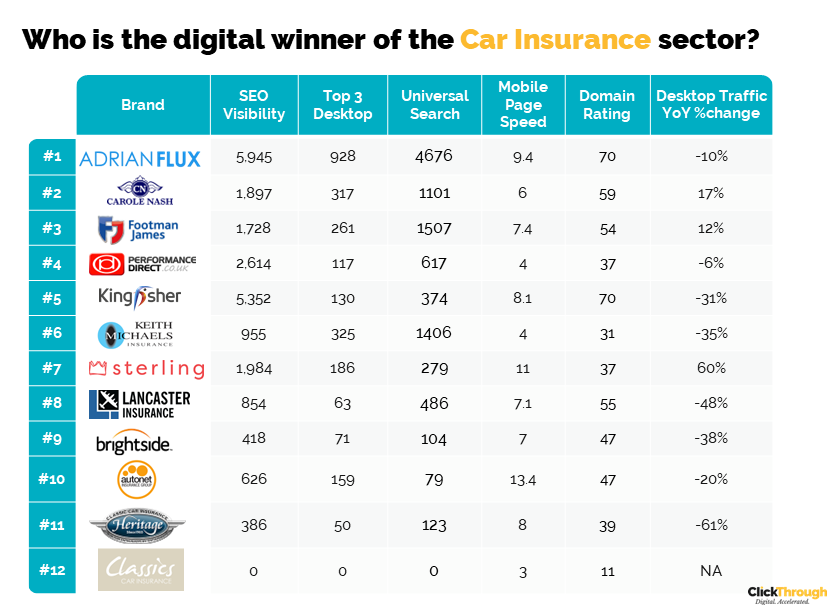The Q3 2022 benchmarking report for UK insurance companies has just been published. Learn how the top 12 UK insurance companies perform across the digital space.
The latest Q3 2022 benchmarking report for UK Insurance companies has just been published. It covers the largest 12 national insurance companies, including Footman James, Lancaster Insurance, Heritage, Performance Direct, Sterling, Brightside, Classics, Keith Michaels, Adrian Flux, Kingfisher, Autonet and Carole Nash, - it highlights year-on-year digital performance, plus winner and loser comparisons in 20+ online performance metrics.
The research gives an inside track on who is winning the biggest marketing share online, and quantifies the gaps, risks and missed opportunities for insurance companies to win brand exposure, drive enquiries and orders. The report highlights quick wins that will improve the performance from your online strategy and identifies the barriers that may be reducing your site’s ability to optimise digital performance.
To see a preview and contents page of the Q3 report, click here. To get a copy of the full report and the key take-aways, please complete the enquiry form or schedule a call. 
What The Industry Research Report Covers
The 70+ pages of research benchmarks each brand based on 50+ metrics and indicators of successful digital strategy, including organic visibility, domain authority, paid media ads, conversion performance, technical performance, site speed, universal search, content, social ads, accessibility, and mobile performance.
Driving Optimal ROAS from Paid Media Channels
Some of the leading players in the space are high spenders on paid media channels such as Google, Bing & Facebook - but have a poor or sub-optimal conversion improvement strategy. Without an optimised, sophisticated conversion strategy that maximises the conversion rate, the return on investment is unsustainable or will under-perform. Scaling spend on paid media is not achievable unless the conversion rate delivers optimal performance in the sector. Some in the space have paid media spend levels from 30k+ per month but dedicate minimal resources and budgets to conversion testing. Given the cost per clicks on ad networks will continue to rise, we recommend spending at least 10% of your paid media budget on ongoing conversion optimisation testing schedules to ensure your paid media ROI maintains long term viability, competitive advantage, and sustainability.
Technical Website Compliance
Savvy digital marketers know that having a technically sound website is an essential component of a successful fully integrated digital strategy - plus a site capable of maximising conversion performance.
We noted that insurance companies generally are very strong when it comes to avoiding website errors, particularly when compared to other sectors we have reviewed. However, Brightside’s significant 331 4xx errors when crawling their website makes them an unfortunate anomaly! Brightside must ensure that users are not being directed to dead ends on their site, which could lead to them turning elsewhere out of frustration.
Site Speed & Conversion Rate Performance
When 62% of consumers are less likely to convert if they have a negative mobile site experience, ensuring that your site is quick and easy to load makes a significant improvement on your overall conversion rates.
In our research, we discovered that only five of the twelve insurance companies in our report achieved an ‘okay’ score of 50-89, the other seven were all below 42, indicating that all these brands have some serious work to do on improving their mobile page speed.
Building Competitive Advantage with Domain Authority
Domain authority is an essential metric for measuring the effectiveness of SEO performance, and helps create a reliable overall gage of how effective your site is at achieving organic traffic, i.e. ‘free’ traffic that isn’t gained through sponsored ads.
Domain authority is considered average between 40 and 50, good between 50 and 60, and excellent above 60. ‘Good’ DA score depends on the competition level of the industry. However, a ‘good’ DA really comes down to how your competitors are performing. In our research, UK insurance companies saw their domain authorities range from an excellent score of 70 to a low score of 11. The six companies at the lower scoring end should focus on building a stronger backlink profile to compete with those at the higher end of this scale.
Organic Performance – Mobile & Desktop
A strong organic performance is strategically important as it ensures your site ranks above competitors for key, transactional keywords. When 93% of your customers won’t go past the first page of Google, your absence or lack of targeting for essential keywords will cost you conversions.
Continuous improvement and optimisation is also needed to secure traffic year on year. We found that only three of the twelve insurance companies have achieved year on year growth in mobile traffic. Carole Nash saw a 13% increase while Heritage suffered a decrease of 80%.
Universal Search Opportunity
Google Universal Search Results is an evolving opportunity to make your pages visible on a SERP (Search Engine Results Page). Universal results often appear before traditional listings and are eye-catching for users. Universal search results refer to rankings on a SERP that are not the traditional ‘blue line’ Google link, and a brand can appear for universal search results without being strong in standard rankings.
Reviews seem to be the most popular universal search result insurance companies are optimising for, with Adrian Flux achieving 1,500 reviews (the most of all brands). However, insurance companies generally appear to be underusing any universal search opportunities, with most appearances clocking into the hundreds, rather than thousands.
The Longtail Keyword Opportunity
Longtail keywords are often considered high intent and potentially more likely to convert as a searcher is being more specific. Optimising for longtail keywords also puts your content strategy in a strong position to rank for brand new search terms as they enter Google’s index.
Classics are ranking for only 11 long-tailed keywords overall, with all of these are ranking outside the top 20. Classics should be looking at how to improve their rankings on existing long-tailed keywords, but also at how they can expand their strategy to include new specific search terms.
Facebook Adverts
With the number of Facebook users in the United Kingdom (UK) forecast to hit over 52 million users by 2022, it is not surprising that companies have jumped at the opportunity to advertise on the social media platform. Facebook’s UK digital advertising revenue has been estimated to have breached 2.6b GB pounds in 2019.
Below, we can see examples of Lancaster's Facebook ads. They’ve used bold, strong, creative to capture the attention of users, including their brand colours on all posts to ensure they are uniform with each other. Anyone that knows their brand will be able to identify these ads without even seeing their name.

Top Social Shares & Content
When it comes to social media and on-site content strategies, it is important to release content that has a longer shelf life. An article is considered 'Evergreen' if it has maintained its relevancy to an audience for longer. It's great for your brand engagement, but great for Google too, who will recognise content which achieves traffic over a long period of time.
With insurance companies offering a range of insurance options, there should be a wide variety of content opportunities for these brands to jump on. However, while some of these brands are showing a consistent content output, Autonet and Lancaster Insurance are lagging behind when it comes to content production. This is a missed opportunity for these brands, who could be sharing content, getting involved in the social media crazes, and sharing information about special offers.
Website Readability & Accessibility
20% of people in the UK have a disability – 2 million of which are people living with sight loss. In addition, 1 in 12 men and 1 in 200 women have some degree of colour vision deficiency. When websites are not designed to meet these needs, brands lose customer interest as they turn elsewhere.
Compared to many sectors we have reviewed, insurance companies appear to be struggling with accessibility within their sites with higher errors across the board than we typically see. All twelve insurance companies are seeing errors, such as Footman James’ 154 alerts, all twelve companies should still be reviewing and optimising their accessibility.
user journeys & conversion rate performance
3.42 seconds are all it takes for a user to judge a site solely on its appearance. For sites with a low clarity score, this means users are getting a poor impression of your brand and aren’t seeing your vital cues to convert.
Keith Michaels achieved the best clarity score of 78. However, with Classics and Footman James only slightly behind, on 77 and 76 respectively, Cinch have plenty of opportunity to widen this gap and ensure their website becomes even clearer and easier to use.
Additionally, we use attention maps to judge user behaviour and assess how customers are interacting with a site. You can see from these examples just how wildly different site designs can impact user attention;

Q3 2022 Winners Leaderboard
For a glance into just 6 of the metrics we evaluated these top 12 insurance companies on, check out our quick-look table below; 
GET THE FULL 70-PAGE Q3 2022 REPORT
To get a copy of the full report, please complete the enquiry form. If you want to talk to us about accelerating your digital performance, please call us on 01543 410014 or schedule a call with Mike Movassaghi
Photo by Greg Banek on Unsplash





Let's be social
Join our growing social communities to learn more about the benefits of digital marketing and the people who make us tick.